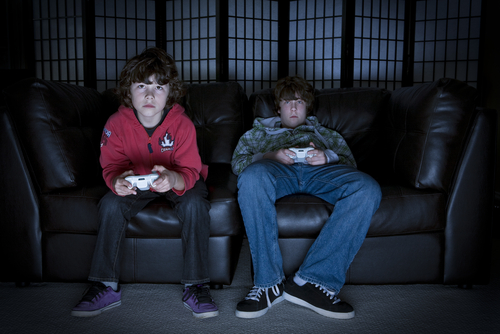Are Adolescents More Aggressive Due to Excessive On-Screen Violence?

With screen time becoming more prevalent for adolescents with each passing day, there is more research that is being conducted in regard to how on-screen violence invokes them. Finding out the effects that teens and younger kids are experiencing is important because the aggressive nature that follows many of them after spending excessive time on their devices has been linked to the material they are viewing.
According to the Academy of Pediatrics (AAP), seeing violence on video games, movies, television shows, social media, or streamed shows is linked to aggressive behaviors, thoughts, and feelings. If their first experience of violence is through a screen, then they may have fears and emotional disturbances about what is in the real world. Their innocence is somewhat lost, and they begin to become desensitized to violence whether they see it virtually or in real life.
The problem with being desensitized to on-screen violence is that they also can be desensitized to real life situations and how to handle them. With the harrowing images that they see being portrayed on a screen, they become less sensitive to the pain and suffering of others. Then they may gradually start to accept the violent nature of the what they are seeing as the solution to solve their problems. They begin to emulate what they see on a fictional program and begin to become aggressive and harmful to others.
Another risk of adolescents seeing more violence is that they often become fearful of the world around them. Sleep disturbances occur, nightmares increase, and their overall anxiety escalates that could prevent the teen from participating in the activities that they desire to or keep them from pursuing their dreams. Seeing fictional and real-life horrors, such as school shootings, gives them a sense of impending doom that may not be able to shake.
What teens need is for parents to limit their exposure to on-screen violence and guidance on what they should be watching on their devices. They also require reassurance and an open-door policy to talk about what they are feeling. Consolation, even when a teenager thinks they do not need it, will give them a sense of security that they truly want.
While parents without helicoptering will not be able to supervise every interaction a teen has on their devices, they do have a great opportunity to talk to their teens about the ways of the world. Parents can give their teenagers more to go off of when they also balance out showing them videos of people who help others in light the virtual violence they are typically use to.
Stonewater Adolescent Recovery Center is a comprehensive dual-diagnosis treatment facility that offers an array of services that range from fully supervised withdrawal management to residential treatment in hopes of gaining long-term sobriety and wellness. Adolescents learn about triggers and healthy replacements to regain a positive physical response to activities they can learn to enjoy again.
Call us today to start living in your recovery: 662-598-4214

.jpg)

